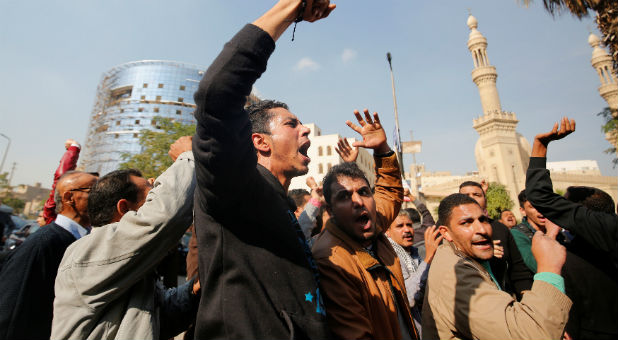Radical Islamists Blow Up at Least 24 Christians Attending Sunday-Morning Church
Egyptian President Abdel Fattah al-Sisi said on Monday a suicide bomber carried out the attack that killed 24 people at Cairo’s Coptic cathedral, the deadliest on the Christian minority in years.
Speaking at a state funeral for the victims, Sisi said four people had been detained, including a woman, and security forces were seeking two more people believed to be involved.
Sisi, who said the bomber was a man wearing a suicide vest, said: “The attack brought us great pain, but we will never be torn apart. We will only be much stronger. We will hold steadfast and, God willing, we will succeed.”
At least 24 people were killed and 49 wounded when a bomb exploded in a chapel adjoining St Mark’s Cathedral, Cairo’s largest church and seat of the Coptic papacy, where security is normally tight.
Security sources said the blast was caused by a bomb containing at least 12 kg (26 pounds) of TNT detonated on a side of the church normally used by women.
Sisi did not name the organization the attackers were believed to belong to. No group has claimed responsibility, but exiled Muslim Brotherhood officials and local militant groups have joined the international community in condemnation. Only Islamic State supporters celebrated on social media.
Sisi is fighting battles on several fronts. His economic reforms have angered the poor, a crackdown on the Muslim Brotherhood has seen thousands jailed and an insurgency rages in Northern Sinai, led by Islamic State’s Egyptian branch.
The group has also claimed attacks in Cairo and urged its supporters to launch attacks around the world as it goes on the defensive in its Iraqi and Syrian strongholds.
The Interior Ministry released a picture of the bomber it identified as Mahmoud Shafik Mohamed Mostafa, 22, from the town of Fayyoum, whose nom de guerre was Abu Dajjana al-Kanani. It also released an image of what it said was the dead bomber’s battered head.
Christian Anger
Egypt held a state funeral for the victims on Monday, with coffins draped in the national flag carried in a procession led by Sisi and Coptic Pope Tawadros II.
Earlier, mourners had packed Cairo’s Virgin Mary and St Athanasius Church, where Pope Tawadros prayed over the wooden coffins. On the walls hung banners bearing the names of the dead, many of them women.
Speaking at the end of the service, Tawadros sought to heal any sectarian friction caused by the attack, saying it “is not just a disaster for the church but a disaster for the whole nation.” He also condemned attacks against the security forces.
“Those who commit acts such as this do not belong to Egypt at all, even if they are on its land,” he said.
At the chapel where the bombing took place, survivors described searching for the body parts of loved ones. The chapel’s floor was covered in debris from shattered windows, its wooden pews blasted apart, its pillars blackened. Here and there lay abandoned shoes and patches of blood. Dazed church officials wondered around in black robes.
Though Christians traditionally support the government, the church attack provoked anger among survivors and the families of the dead, who said police had failed to protect them.
Five survivors at Dar al-Shefa hospital said police did not conduct the usual checks as the cathedral was particularly busy for Sunday’s mass, which took place on a public holiday marking the Prophet Mohammad’s birthday, just weeks before Christmas.
“There were large numbers so people entered without being searched,” said Mina Francis, who was at the mass with his mother, who was killed.
Crowds outside the cathedral on Sunday demanded revenge. Scuffles broke out as protesters accused police of security failures. Some chanted “the people demand the fall of the regime,” the rallying cry of the 2011 revolt that ended Hosni Mubarak’s 30-year rule.
“There were police cars stationed in front of the church gates … they were too busy eating breakfast and drinking tea and soda. They weren’t doing their job,” said Hani Gaballah, 43, a retired military officer.
Sisi dismissed accusations of a security failure. He called for tighter anti-terrorism laws to help crush militants in a country where Egyptians already face restrictive protest laws.
“We will not let this go even after we have arrested them,” Sisi said.
Orthodox Copts, who comprise about 10 percent of Egypt’s 90 million people, are the Middle East’s biggest Christian community. They face regular attack by Muslim neighbors, who burn their homes and churches in poor rural areas, usually in anger over an interfaith romance or church construction.
The last major attack on a church took place as worshippers left a New Year’s service in Alexandria weeks before the start of the 2011 uprising. At least 21 people were killed. The circumstances remain a mystery and no one was punished.
Middle-Eastern Christians have felt increasingly insecure since Islamic State spread through Iraq and Syria in 2014, ruthlessly targeting religious minorities. {eoa}
© 2016 Thomson Reuters. All rights reserved.















































